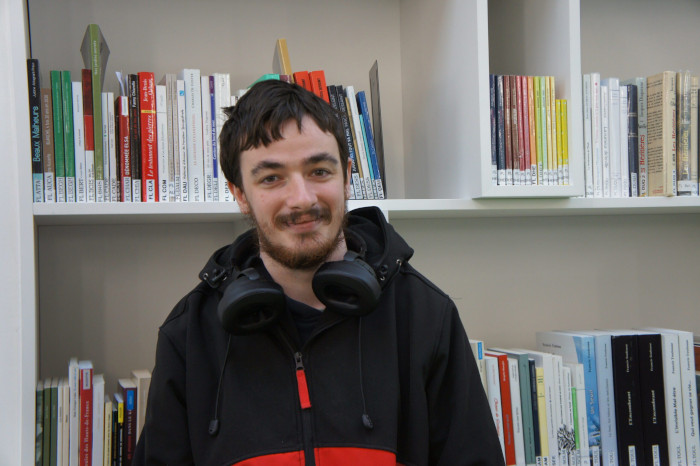A Commitment Towards “Feeling Supported” and “Helping Others in Need”

Above: Jimmy Dussap
![]() Reading time 5 minutes
Reading time 5 minutes
A member of ATD Fourth World’s Dunkirk youth group for just over a year, Jimmy Dussap has discovered “a friendly space where people support each other.”
With headphones almost permanently glued to his ears, Jimmy Dussap tries to escape a sometimes difficult day-to-day reality. The 24-year-old primarily listens to zouk and songs from the 1980s: “I’m not really into the music that’s popular now. When you listen to the lyrics, they don’t mean anything and they’re full of swear words,” he explains. He prefers the calm of libraries, tea, walks, and horses, and the current state of the world makes him very anxious. “There are wars everywhere, inflation, students who have to go to food banks to survive, humans being gradually replaced by robots…” he lists, pessimistic about the future. It was to help him break out of his isolation that, in early 2024, the mother of one of his friends suggested he join ATD Fourth World.
There, he discovered “a really welcoming place where people support each other”. Since then, he has participated in the Fourth World People’s Universities, youth workcamps, and went to the youth gathering “Heading for Hope and Youth” in June 2024. He also went on a trip to discover ATD Fourth World, during which he visited the Joseph Wresinski Archives and Research Centre outside of Paris. This centre, which preserves the life stories, struggles, thoughts, and courage of the poorest people around the world and those who have stood beside them since 1957, left a lasting impression on him.
Longing for a “different life”
Every outing with ATD Fourth World allows him to “unwind,” but also to “feel supported” and talk about his struggles. Jimmy grew up in foster families, separated from his parents and five sisters. “Some I got on well with, others not so much, but I would move about every two years,” he recalls. In secondary school, halfway through Year 10, he is offered a place at an IME (a medical and educational institute), “a place for those struggling, who need more time to get tasks done,” he describes. This decision is a relief to him because, despite liking school, he can’t keep up in class. “My handwriting was messy. The teacher went too fast, especially when we had to take notes.”
At the IME, Jimmy discovers new activities like cooking, gardening, and car maintenance. He enjoys these, allowing him to imagine a possible future career. But then the COVID-19 pandemic hits. Jimmy, 19 at the time and decides to leave the IME to stay with his father, who suffers from a serious chronic respiratory illness. With no qualifications and no job, he finds himself alone with his sick father. “I’m the one who looks after his money, his bills, everything at home. I’m starting to get tired of it — I’m 24 now and I’d like a different life, but I don’t know how to make it happen,” he says with a faint, resigned smile.
Confronting institutional mistreatment
His only work experience in an ESAT (a sheltered work environment for people with disabilities) ended badly. “They yelled at me in the very first hour, so I left,” he says. He would like to work in catering, or maybe in a customer service role, but the few applications he has sent have gone unanswered. “Employers are put off when they see IME on my CV. They don’t want to hire someone with a disability,” he says regretfully.
When Jimmy first heard about institutional mistreatment at ATD Fourth World, he didn’t really understand what it meant. But with time, it starts to make sense, and Jimmy can list many examples from his own life. “With the MDPH (Departmental Centre for Disabled Persons, you have to renew your file every five years. But once you’re disabled, it’s not just for five years. These are huge files which take more than six months for approval, so you have to start them well in advance,” he explains. Even though he’s “pretty good with digital stuff” and spends a lot of time on social media, Jimmy still struggles with how quickly everything is becoming digitised when it comes to claiming his rights. “When you have to scan documents and make sure the format and file size are exactly right, it’s a real
nightmare,” he says.
Guardianship
Jimmy has also been under reinforced guardianship for the past five years. This means an external guardian is responsible for managing his income. The court recently eased this legal measure for a period of three years, as Jimmy has shown he can handle his budget. “The judge sees all my bank statements. He asks trick questions to check if I’m paying attention to my spending, why I spent more money on a particular day… It’s like if I asked him what he did with his salary. I don’t dare say it to him, but I definitely think it,” he explains. “He agrees that I manage things well, but once you’re under guardianship, it’s not easy to get out of it.”
At ATD Fourth World, he’s learned that he is “not alone.” The outings and activities offered by ATD helps him to “feel free.” They’ve also shown him that “solidarity exists” and have inspired him to “help other people who are struggling.”
First published in the ATD Fourth World Journal, June 2025.

